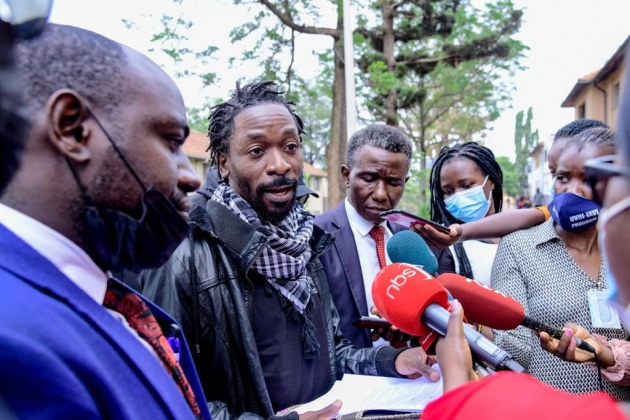KAMPALA, UGANDA: The new Computer Misuse Amended Act, 2022 has been challenged before the East African Court of Justice, barely a week after President Museveni assented to it.
A democracy and human rights watchdog Legal Brains Trust (LBT) is challenging the government of Uganda fore the regional court to have the recently passed Computer Misuse (Amendment) Act nullified.
The petition filed Monday, October 17 before the First Instance Division of the Arusha-based East African Court of Justice, listed Uganda’s Attorney General of Uganda who has been summoned to file the government’s response within 45 days without fail as its first respondent.
“The applicant (Legal Brains Trust) alleges that all the provisions of Uganda’s Computer Misuse (Amendment) Act passed by Parliament of Uganda on September 9, or thereabouts and signed into law by the President, on October 13, are an infringement of the principles of good governance enshrined in Articles 6 (d) and 7 (2) of the Treaty for the establishment of the East African Community, including adherence to the principles of democracy, rule of law, accountability, transparency, social justice, equal opportunities, as well as the recognition, promotion, protection and maintenance of universally accepted standards of human rights,” reads the petition in part.
According to Legal Brains Trust, the Government of Uganda violated its duties under Article 9 of the African Charter on Human and Peoples’ Rights, Article 19 of the International Covenant on Civil and Political Rights, and Articles 29(1)(a) and 43 of the Constitution of Uganda, which set a high standard for democracy and freedom of expression in the region, and thereby failing to abide by the principles of good governance enshrined in Articles 6(d) and 7(2) of the East African Community Treaty.
Regarding good governance, Legal Brains Trust asserts this about the amended law: “It is a defectively processed blunt instrument that disproportionately restricts freedom of expression online on vague, overly broad and unfounded pretexts, and will immediately be weaponised by the Ugandan authorities to silence dissent and prevent people from speaking out against bad governance.”
Legal Brains Trust seeks a declaration from the East African Court of Justice that all the provisions of Uganda’s Computer Misuse (Amendment) Act, 2022 as recently passed are an infringement of the principles of good governance enshrined in Articles 6(d) and 7(2) of the East African Community Treaty, and hence invalid.
The democracy and human rights watchdog also wants the court to issue an order directing the government of Uganda to cease and desist from implementing any part of the contested law, order that Uganda amends its law to reflect the findings of the Court and report back to the Court within 60 days or any time as the court may determine. The petitioner also wants to be awarded costs of the suit.
The Executive Director of the legal firm Advocate Isaac Ssemakadde contacted for a comment on the petition filed said it is very surprising that even when the anti-democratic resolution was recently passed, there are still means being established to suppress critical voices of Uganda through such ‘unwelcoming’ laws.
“This matter is too important to be left to the biased, lethargic and emasculated local judiciary. At their 23rd annual conference in February this year, the senior judges and justices of Uganda passed an anti-democratic resolution literally urging the government to conduct further surveillance and repression of critical voices on the Internet.”
He added; “Ugandan security and intelligence operators, prosecutors, magistrates and even High Court judges routinely violate the freedom of internet users with impunity, and the Constitutional Court has abdicated its human rights protection mandate by unreasonably failing to determine a dozen petitions challenging draconian provisions in the pre-existing computer misuse law since its commencement in 2011. Clearly, maize cannot expect justice in a court composed of chickens.”
Background of the law
President Museveni on Thursday, October 13, 2022, signed into law the controversial Computer Misuse (Amendment) Bill 2022 which criminalizes unauthorized access to data and prohibits the sharing of data relating to children without authorization from parents or guardians.
The Bill which now becomes an Act of Parliament was passed by August House on September 8, 2022 amid criticism from several human rights defenders and other stakeholders who argued that it was drafted in bad faith, to protect the corrupt while penalising those demanding for accountability from their leaders.
Also READ: MUST READ: How the new Computer Misuse Bill will affect you
The legislation, which was introduced by Kampala Central MP, Mr Muhammad Nsereko, listed a raft of punitive measures against people who send malicious information, hate speech, unsolicited information and sharing information about children without the consent of their parents or guardians. The punishment for the convicted person is Shs15 million or a seven-year jail term, if not both.
The law also criminalises writing, sending or sharing of any information through a computer, which is likely to ridicule, degrade or demean another person, group of persons, tribe, ethnicity, religion, or gender; create divisions among persons, a tribe, an ethnicity, a religion or gender; and or, promote hostility against a person, group of persons, a tribe, an ethnicity group, a religion or gender.
The law also prohibits sending or sharing false, malicious and unsolicited information.
Do you have a story or an opinion to share? Email us on: dailyexpressug@gmail.com Or follow the Daily Express on X Platform or WhatsApp for the latest updates.

